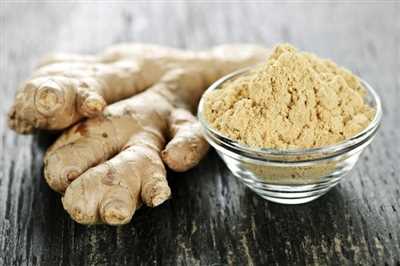
If you love ginger and its many therapeutic and health benefits, making your own ginger powder is a great way to ensure you always have it on hand. Using fresh ginger root to make your own ginger powder ensures that you know exactly what ingredients are going into your spice. Store-bought ginger powder often contains preservatives and additives that you may want to avoid. Additionally, making your own ginger powder allows you to give it the consistency you desire.
Here is a simple recipe to make ginger powder:
1. Start by selecting fresh ginger with firm and plump stems. Check the ginger for any signs of mold or deterioration before proceeding.
2. Peel the ginger roots using a peeler or a spoon to remove the rough skin. Make sure to remove any brown spots as well.
3. Cut the peeled ginger into small pieces roughly 1 inch in length. This will help with the drying process and make it easier to grind later on.
4. Spread the ginger pieces evenly on a dehydrator tray. If you don’t have a dehydrator, you can also use an oven on the lowest setting.
5. Turn on your dehydrator or oven and allow the ginger to dry. This process can take several hours to even a day, depending on the drying method used. Keep an eye on the ginger and check its dryness periodically.
6. Once the ginger is completely dry and brittle, transfer it to a spice grinder or a blender. Grind the dried ginger until it reaches a fine powder consistency.
7. Your homemade ginger powder is now ready to use in your favorite recipes, tea, or even as a therapeutic ingredient in health and wellness routines.
It’s important to note that homemade ginger powder may have a shorter shelf life compared to store-bought options. To extend its freshness, store it in an airtight container in a cool and dry place. Freezing ginger powder is also an option if you want to preserve it even longer.
So, why not try making your own ginger powder? Not only is it easy and cost-effective, but it also gives you full control over the quality and purity of the spice. Enjoy the rich flavor and health benefits that ginger has to offer!
Sources:
Dehydrate ginger root and make ginger powder

Ginger root is a versatile ingredient that can add a unique flavor and aroma to many recipes. However, using fresh ginger root can sometimes be inconvenient, as it has a relatively short shelf life. To solve this problem, you can dehydrate ginger root and make ginger powder, which not only extends its life but also makes it easier to use in various dishes.
Here are the steps to dehydrate ginger root and make ginger powder:
- Peel the ginger root using a spoon or a vegetable peeler. Make sure to remove all the rough outer skin.
- Slice the ginger root into thin, long stems. The thickness of the slices will depend on your desired powder texture.
- Spread the ginger slices on a dehydrator tray or a baking sheet lined with parchment paper.
- Place the tray in a dehydrator or an oven set to its lowest temperature. Leave the ginger slices to dry until they are brittle. This can take up to several hours, so check periodically.
- Once the ginger slices are completely dry, remove them from the dehydrator or oven and let them cool.
- Grind the dried ginger slices in a spice grinder or a food processor until you achieve a powdered consistency.
- Store the ginger powder in an airtight container in a cool, dry place. It can stay fresh for several months.
Ginger powder made from dehydrating ginger root has many uses. It can be used as a spice in various recipes, such as curries, stir-fries, and baked goods. It adds a warm and slightly spicy flavor to dishes.
Moreover, ginger powder has therapeutic properties and is commonly used in traditional medicine. It is known to have anti-inflammatory and antioxidant effects, among other health benefits. Adding ginger powder to your diet can help boost your immune system and aid digestion, among other things.
Importantly, making ginger powder at home ensures that you have a preservative-free and additive-free product. Store-bought powders may contain unwanted ingredients, whereas homemade powder gives you full control over the quality and freshness.
So, if you have some ginger root and would like to extend its shelf life while enjoying the many benefits it offers, dehydrating it and making ginger powder is a great option. Follow the steps outlined above, and you’ll have a versatile spice ready to enhance your favorite dishes.
How to make ginger powder
Ginger powder is a versatile ingredient that is used in many recipes and has numerous health benefits. Making ginger powder at home is a simple process that can be done using fresh ginger root and a few easy steps.
To make ginger powder, you will need the following ingredients:
- Fresh ginger root
Here are the steps to make ginger powder:
- Start by peeling the ginger root to remove the outer skin. You can use a vegetable peeler or the back of a spoon to do this.
- Once peeled, cut the ginger root into small, roughly chopped pieces. This will help with the drying process.
- Spread the ginger pieces out on a dehydrator tray or a baking sheet lined with parchment paper.
- Set your dehydrator or oven to the lowest setting. Dehydrate the ginger pieces until they are completely dry. This can take several hours, so be patient.
- Once the ginger is dry, allow it to cool completely.
- Using a spice grinder or a mortar and pestle, grind the dried ginger pieces into a fine powder. Make sure to check for any remaining fibrous pieces and remove them.
- Store the ginger powder in an airtight container in a cool, dry place. This will help to extend its shelf life.
Ginger powder can be used in a variety of ways. It can be added to spice blends, used in teas, or incorporated into recipes to add a warm and spicy flavor. Additionally, ginger powder has many therapeutic uses and is often used to help with digestion, relieve nausea, and reduce inflammation.
By making your own ginger powder at home, you can ensure that it is free from preservatives and any unwanted additives. Moreover, you can adjust the drying time to your desire, giving you full control over the quality and freshness of your ginger powder.
Try making your own ginger powder today and experience the many benefits it has to offer!
Drying Ginger

Drying ginger is an excellent way to preserve this versatile root and extend its shelf life. Whether you want to use it in tea, recipes, or for therapeutic purposes, ginger powder can be a valuable addition to your kitchen. Making ginger powder at home allows you to have control over the quality of the ingredients and ensures that your ginger powder is free from preservatives.
Here are the steps to dehydrate and make ginger powder:
- Start by choosing fresh ginger root with smooth skin and firm stems. Check for any visible signs of mold or rot.
- Wash the ginger root thoroughly and peel it using a spoon or a knife. Remove any rough or uneven parts.
- Once peeled, slice the ginger root into thin, even pieces. The slices should be roughly the same thickness to ensure even drying.
- Place the ginger slices on a clean, dry tray or a dehydrator rack. Make sure they are evenly spaced and not overlapping to promote airflow.
- Set your dehydrator to the lowest temperature setting, typically around 115°F (46°C). If you’re drying ginger in the oven, set it to the lowest temperature and prop the oven open slightly to allow moisture to escape.
- Dry the ginger slices until they become brittle and snap easily when bent. This can take anywhere from 4 to 6 hours in a dehydrator and longer in an oven.
- Once dried, allow the ginger slices to cool completely before grinding them into powder.
- Use a spice grinder or a mortar and pestle to grind the ginger slices into a fine powder. You can also use a coffee grinder, but make sure it’s clean and dedicated to spices.
- Store the ginger powder in an airtight container in a cool, dark place. Check for any signs of moisture or spoilage periodically.
Ginger powder can be added to a wide range of dishes and beverages, including curries, stir-fries, smoothies, and ginger tea. It adds a warming and slightly spicy flavor and can provide various health benefits. Make sure to use the desired amount in your recipes and enjoy the many uses of ginger powder!
Ginger tea recipe using fresh ginger
Ginger tea is a popular and refreshing beverage that can be made easily using fresh ginger root. Unlike store-bought tea bags that often contain preservatives and artificial flavors, making ginger tea at home allows you to control the ingredients and enjoy the natural flavors and therapeutic benefits of ginger.
To make ginger tea using fresh ginger, follow these simple steps:
- Peel the ginger root using a knife or a spoon. Remove any rough spots or dirt.
- Slice the ginger into thin pieces. The amount of ginger used will depend on how strong you want your tea to be. Generally, 1-2 tablespoons of sliced ginger is a good starting point.
- Bring water to a boil in a pot or kettle.
- Add the sliced ginger to the boiling water and let it simmer for about 10-15 minutes. If you want a stronger ginger flavor, you can simmer for a longer time.
- Remove the pot from heat and let the ginger steep in the hot water for another 5 minutes.
- Strain the tea to remove the ginger slices.
- You can add honey or lemon juice to enhance the taste, if desired.
Ginger tea can be enjoyed hot or cold, depending on your preference. It has a spicy and invigorating flavor that makes it a perfect drink for any time of the day. Moreover, ginger tea is known for its numerous health benefits, including aiding digestion, reducing inflammation, boosting the immune system, and relieving nausea.
By making your own ginger tea using fresh ginger root, you can be sure that you are getting all the natural goodness without any added artificial ingredients or preservatives. So why not give it a try and enjoy the delicious taste and therapeutic effects of ginger tea today?
Ingredients
To make ginger powder, you will need the following ingredients:
- Fresh ginger root
It is important to use fresh ginger root for this recipe, as it provides the best flavor and therapeutic uses. Check the ginger root to ensure it is firm and free from any soft spots or mold.
Additionally, using fresh ginger root allows you to control the quality and purity of your ginger powder. Many store-bought ginger powders may contain preservatives or have a long shelf-life, which can diminish its health benefits.
If desired, you can peel the ginger root before drying it. However, this step is not necessary, as the peel has many health benefits and gives the ginger powder a rougher texture.
When dehydrating the ginger root, it is crucial to remove any rough stems or spots. Roughly chop the ginger root into small pieces to facilitate the drying process.
Once you have all the ingredients ready, follow the steps in your desired recipe to dehydrate the ginger root and grind it into a fine powder. Store the ginger powder in an airtight container until you are ready to use it.
Using homemade ginger powder can enhance the flavors of your dishes and give them a health boost. Experiment with different recipes and therapeutic uses to make the most of this versatile ingredient.
Steps
Here are the steps to make ginger powder:
Step 1: Preparation
Start by gathering all the necessary ingredients – fresh ginger root, a knife, a peeler, a dehydrator or an oven, and a blender or coffee grinder. It’s important to use fresh ginger root for the best flavor and therapeutic benefits.
Step 2: Peel and Slice
Peel the ginger root using a knife or peeler, and then slice it into thin, even pieces. This will help the ginger dry more quickly and evenly.
Step 3: Dehydrate
Place the ginger slices onto the dehydrator trays or a baking sheet, making sure they are evenly spread out. Set the dehydrator to a temperature between 95-105°F (35-40°C), or preheat your oven to the same temperature. Leave the ginger slices to dehydrate for several hours or until they are completely dry and brittle.
Step 4: Grind
Once the ginger slices are fully dried, transfer them to a blender or coffee grinder, and pulse until you have a fine powder. Make sure to check the texture periodically to avoid over-grinding and turning the ginger into paste.
Step 5: Store
Transfer the ginger powder into an airtight container, preferably a glass jar with a tight lid. Store it in a cool, dry place away from direct sunlight and moisture. Properly stored, ginger powder can have a shelf life of up to two years.
Now you have homemade ginger powder that you can use in various recipes, including tea, desserts, and savory dishes. Enjoy the fresh and free-from-preservatives flavor that only homemade ginger powder can give!
Remember, using ginger powder in your cooking can not only add flavor but also provide numerous health benefits. Ginger is known for its anti-inflammatory and digestive properties, making it a valuable ingredient in many cuisines and traditional remedies.
Ginger Powder Recipes
Making ginger powder at home is a great way to give your dishes a burst of flavor and reap the numerous health benefits of this amazing root. Here are some delicious ginger powder recipes that you can try using this versatile ingredient.
1. Ginger Tea: Using ginger powder to make tea is a quick and easy way to enjoy its therapeutic properties. Simply add a teaspoon of ginger powder to a cup of hot water, steep it for a few minutes, and enjoy a soothing and refreshing drink.
2. Ginger Powder in Smoothies: Add a teaspoon of ginger powder to your favorite smoothie recipe to give it a spicy kick and enhance its health benefits. Ginger is known to aid digestion and boost the immune system, making it a perfect addition to any smoothie.
3. Ginger Powder Curry: Use ginger powder to spice up your curries. It adds a warm, earthy flavor that complements a variety of ingredients. Simply add a teaspoon or two of ginger powder to your curry recipe and adjust the amount according to your taste.
4. Ginger Powder Stir-Fry: For a quick and healthy stir-fry, sprinkle some ginger powder on your vegetables or protein before cooking. This will give your dish a delicious zing and provide you with the therapeutic benefits of ginger.
5. Ginger Powder Marinade: Make a simple marinade by mixing ginger powder with a few other ingredients like soy sauce, honey, and garlic. Use this marinade to marinate meat, seafood, or tofu before grilling or baking. The ginger powder will add a fantastic flavor to your dishes.
Remember, when making ginger powder, it’s important to dehydrate the ginger root properly to preserve its therapeutic properties. Start by peeling and roughly chopping the ginger root into small pieces. Then, spread them out on a baking sheet and let them air dry in a cool, dark place for several days or use a food dehydrator. Once the ginger is completely dry, grind it into a fine powder using a spice grinder or mortar and pestle.
Store your homemade ginger powder in an airtight container, preferably in a cool and dark place, to keep it fresh for a long time. This will ensure that you have ginger powder readily available whenever you want to add flavor and health benefits to your dishes.
So go ahead and check out these ginger powder recipes. Get creative and experiment with different ingredients and flavors. Ginger powder can be a game-changer in the kitchen, so don’t hesitate to give it a try!
Shelf life
After you make ginger powder from fresh ginger root, it is important to know how long it can be stored for. The shelf life of ginger powder can vary depending on how it is stored and if any preservatives are added. Generally, ginger powder can be stored for up to two years if kept in an airtight container in a cool, dark place.
It is important to note that the shelf life of ginger powder may be shorter if it is not properly dehydrated or if the ginger used to make the powder was not fresh. Using fresh ginger root and drying it properly before making the powder would give it a longer shelf life.
Ginger powder is a versatile ingredient that can be used in many recipes. It can be used to give a spicy kick to dishes, added to tea for a soothing drink, or even used as a flavoring in desserts. Those who desire the health benefits of ginger can incorporate the powder into their daily routine.
To check if the ginger powder is still fresh, you can do a quick smell test. If it still smells strong and aromatic, it is likely still good to use. However, if it smells musty or has lost its potency, it is best to discard it and make a fresh batch.
It is also worth noting that ginger powder can be stored in the freezer to extend its shelf life. Freezing the powder can help preserve its flavor and aroma for longer periods. Just make sure to store it in an airtight container to prevent moisture from entering.
In conclusion, the shelf life of ginger powder can vary but with proper storage, it can last for up to two years. Whether you use it in recipes or for its health benefits, ginger powder is a versatile ingredient that can be easily made at home.
Sources
When it comes to making ginger powder, there are several sources that you can turn to:
- Recipes: There are numerous recipes available online and in cookbooks that provide step-by-step instructions on how to make your own ginger powder.
- Health benefits: Many sources highlight the therapeutic properties of ginger and recommend using ginger powder as a natural remedy for various health issues.
- Drying methods: Different sources suggest different methods for drying ginger, from air drying to using a food dehydrator. Each method has its own benefits and drawbacks, so it’s important to check multiple sources to find the one that works best for you.
- Shelf-life: Understanding how to store ginger powder is crucial for maintaining its freshness and potency. Some sources recommend storing it in an airtight container in a cool, dark place, while others suggest freezing it to extend its shelf life.
- Free from additives: For those who desire a pure, preservative-free ginger powder, it is important to check the packaging and select a product that is made with only ginger root and nothing else.
- Uses: Sources can provide ideas and inspiration for the many ways you can use ginger powder in your cooking and daily life. From adding it to teas and smoothies to incorporating it into your favorite recipes, ginger powder can give a unique flavor and health boost to your dishes.
By consulting various sources, you’ll be able to gather a wealth of information on how ginger powder is made, its different uses, and how to incorporate it into your daily routine. Whether you’re looking for a long shelf life or the therapeutic benefits of ginger, these sources can guide you on your ginger powder journey.










